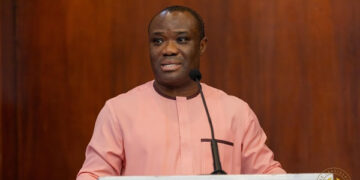Governor of the Bank of Ghana, Dr. Ernest Addison has assured the public of the soundness and stability of the banking industry, despite significant domestic debt exchange-related losses in 2022.
Speaking at the Chartered Institute of Bankers (CIB) Ghana 2023 Governor’s Day in Accra, Dr. Addison emphasized that measures taken between 2017 and 2019 aimed to fortify the banking sector against potential shocks, such as those experienced in 2020 and 2022.
He further explained that the 2022 audited financial statements of the banks, following the Domestic Debt Exchange Programmes (DDEP), revealed considerable impairments in their capital levels, largely due to substantial percentages of their assets being held in Government of Ghana bonds.
According to him, the market-to-market valuation losses, in conjunction with increased impairments on loans and rising operating costs, led to significant financial setbacks.
“To moderate the potential impact and help safeguard stability, the Central Bank gave temporary regulatory reliefs for banks and SDIs who participate in the DDEP. While these reliefs were intended to cushion banks and SDIs from the impacts, the bank of Ghana expected them to fully restore capital gaps over the next three years, ending 31st December 2025,” he continued.
Additionally, the Government of Ghana outlined an operational framework for eligible banks to access capitalization support from the Ghana Financial Stability Fund.
Despite the challenges posed in 2022, prudential data up to October 2023 reflects relative stability in the banking sector, with Dr. Addison noting an increase in total assets and deposits.
Banks have demonstrated relatively strong profitability, with an industry profit after tax of 7.1 billion, representing a growth of 60.4% compared to the previous year.
Dr. Addison emphasized that while the capital adequacy ratio adjusted for regulatory reliefs stood at 13.4% in October, the industry’s nonperforming loan ratio increased to 18.3% in October 2023, attributed to heightened credit risk associated with the lagged effect of the macroeconomic crisis in 2022.
Dr. Addison stated that the banking clean-up exercise, the COVID-19 pandemic, and the economic crisis of 2022 posed significant challenges, but banks have remained relatively stable and sound due in part to the leadership provided to navigate through these economic uncertainties and volatilities.
Read more stories here
Source: Eric Sekyi/ATLFMNEWS



























